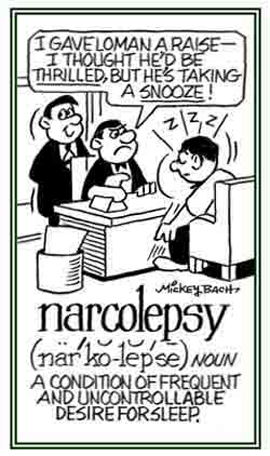-lepsy, -lepsia, -lepsis, -leptic
(Greek: a suffix; a violent attack, a seizing)
2. A sudden loss of muscle tone (cataplexy) induced by uproarious laughter.
Cataplexy is a debilitating medical condition in which a person suddenly feels weak and collapses at moments of strong emotion; such as, laughter, anger, fear, or surprise.
Laughter and other emotions trigger a reflex in persons that can bring many of the muscles of the body to the point of collapse.
2. A sudden loss of muscle tone (cataplexy) caused by uproarious (loud and unrestrained) laughter.
The patient is unable to control these spells of sleep but is easily awakened. These attacks may be distinguished from ordinary drowsiness following a meal by the frequency of the occurrence of such attacks, their irresistibility, and their happening in unusual circumstances; such as, while eating, standing, or conversing.
2. A disease resembling hysteria in its nature, and characterized by the occurrence of epileptiform convulsions or a disorder of the central nervous system expressed by a loss of consciousness and convulsions.
2. A sleep disorder that usually appears in young adulthood, consisting of recurring episodes of sleep during the day, and often disrupted nocturnal sleep: Quite often, narcolepsy is accompanied by sleep paralysis and hallucinations.

Sometimes narcolepsy is described as "sleep attack"
There are times when narcolepsy, or severe sleepiness, occurs so suddenly and with such overwhelming power that it is referred to as a "sleep attack".
Some victims have several "attacks" each day. Excessive daytime sleepiness often occurs at inopportune times: in the classroom, at business meetings, during a meal, in the middle of a conversation, or even when active before an audience of people; such as, an announcer on TV as shown in the above image.
Narcolepsy is a chronic neurological disorder caused by the brain's inability to regulate sleep-wake cycles normally.
At various times throughout the day, people with narcolepsy experience fleeting urges to sleep. If the urge becomes overwhelming, individuals will fall asleep for periods lasting from a few seconds to several minutes.

Go to this Word A Day Revisited Index
so you can see more of Mickey Bach's cartoons.
2. A frenzy supposed by ancient peoples to have been induced by nymphs.
3. At some former time, a demonic frenzy, especially frenzy arising from a desire for an unattainable ideal.
2. Capable of receiving a sense impression.
Assuming a future act as already bearing consequences; any notion that arises spontaneously in the mind, as distinguished from concepts resulting from conscious reflections.


